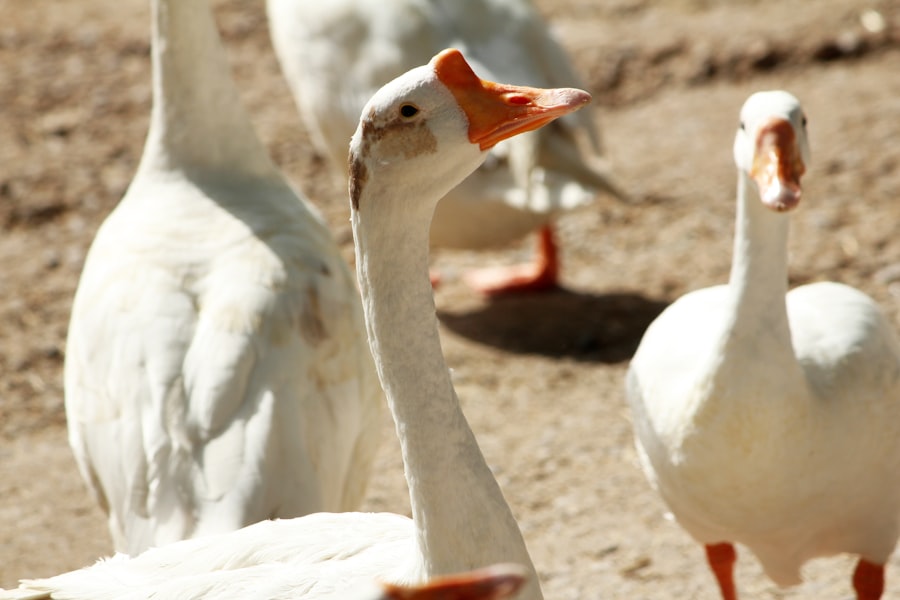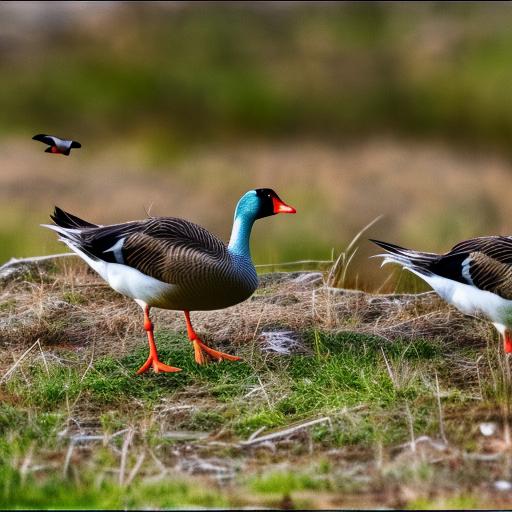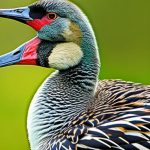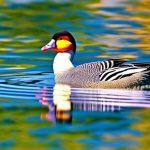Having geese on your property can be a nuisance. They can cause damage to your lawn, leave droppings everywhere, and even become aggressive towards humans or other animals. Fortunately, there are several methods that can be used to deter geese and keep them off your property. In this article, we will explore different strategies for deterring geese, including physical barriers, visual deterrents, sound deterrents, taste deterrents, keeping your property clean, utilizing trained dogs, installing motion-activated sprinklers, planting goose-resistant landscaping, and seeking professional help.
Key Takeaways
- Geese are social animals and tend to stay in groups.
- Physical barriers like fences and netting can prevent geese from accessing certain areas.
- Visual deterrents like decoys and reflective tape can scare geese away.
- Sound deterrents like loud noises or predator calls can also keep geese away.
- Taste deterrents like bitter sprays can discourage geese from feeding on plants.
Understanding the behavior of geese
To effectively deter geese from your property, it is important to understand their habits and behavior. Geese are social animals that typically live in flocks. They are attracted to areas with open water, such as ponds or lakes, as well as areas with ample food sources. Geese are also attracted to areas where they feel safe and protected from predators. They prefer open spaces where they can easily spot any potential threats.
Creating physical barriers to keep geese out
One effective method for keeping geese off your property is to create physical barriers that prevent them from accessing certain areas. There are several types of physical barriers that can be used, including fences, netting, and floating barriers. Fences should be at least three feet high and have small openings to prevent geese from squeezing through. Netting can be installed over ponds or other bodies of water to prevent geese from landing and swimming. Floating barriers can be placed in water to create a barrier that prevents geese from accessing certain areas.
Using visual deterrents to scare geese away
Visual deterrents can be an effective way to scare geese away from your property. These deterrents use visual stimuli that make the area appear unsafe or threatening to the geese. Some common visual deterrents include scarecrows, reflective tape, and predator decoys. Scarecrows can be placed in open areas to make geese think there is a human presence. Reflective tape can be hung from trees or other structures to create movement and reflect light, which can scare geese away. Predator decoys, such as fake owls or coyotes, can also be effective in deterring geese.
Using sound deterrents to keep geese away
Sound deterrents can be used to create a noisy environment that is unpleasant for geese. These deterrents use loud noises or sounds that mimic predators to scare geese away. Some common sound deterrents include propane cannons, ultrasonic devices, and bird distress calls. Propane cannons produce loud bangs at regular intervals to create a loud and unpredictable noise that scares geese away. Ultrasonic devices emit high-frequency sounds that are unpleasant for geese but not audible to humans. Bird distress calls mimic the sounds of injured or distressed birds, which can scare geese away.
Using taste deterrents to discourage geese from feeding

Taste deterrents can be used to make the food sources on your property unappealing to geese. These deterrents are typically applied to grass, plants, or other vegetation that geese like to feed on. Some common taste deterrents include bitter sprays, hot pepper sprays, and garlic sprays. Bitter sprays contain a bitter-tasting substance that makes the grass or plants unpalatable to geese. Hot pepper sprays contain capsaicin, the compound that gives peppers their heat, which irritates the geese’s mouth and throat. Garlic sprays have a strong odor that repels geese.
Keeping your property clean and free of food sources
One of the most effective ways to deter geese from your property is to keep it clean and free of food sources. Geese are attracted to areas where they can find ample food, so eliminating these food sources can discourage them from staying on your property. Make sure to clean up any spilled birdseed or pet food, as these can attract geese. Additionally, regularly remove fallen fruit from trees and clean up any food scraps or garbage that may be left outside.
Utilizing trained dogs to deter geese
Trained dogs can be an effective deterrent for geese. Geese are naturally afraid of predators, and the presence of a dog can make them feel unsafe and encourage them to leave the area. There are several breeds of dogs that are particularly good at deterring geese, such as Border Collies and Labrador Retrievers. To effectively use a dog as a deterrent, it is important to properly train them. This includes teaching them basic obedience commands, as well as specific commands for deterring geese, such as “leave it” or “go away.”
Installing motion-activated sprinklers
Motion-activated sprinklers can be an effective way to deter geese from your property. These sprinklers are equipped with motion sensors that detect the presence of geese and automatically spray water in their direction. The sudden burst of water startles the geese and makes them feel unsafe, encouraging them to leave the area. To install motion-activated sprinklers, simply place them in areas where geese are likely to gather, such as near ponds or on lawns.
Planting goose-resistant landscaping
Another method for deterring geese is to plant goose-resistant landscaping. This involves choosing plants that geese do not like to eat or that have thorny or prickly foliage that makes it difficult for geese to feed on them. Some examples of goose-resistant plants include yarrow, lavender, and ornamental grasses. It is also important to avoid planting grass varieties that are particularly attractive to geese, such as Kentucky bluegrass or fescue.
Seeking professional help for persistent geese problems
If you have tried various methods to deter geese from your property and are still experiencing persistent problems, it may be necessary to seek professional help. There are companies that specialize in geese control and can provide more advanced methods for deterring geese, such as laser deterrents or trained falcons. When hiring a professional, make sure to do your research and choose a reputable company with experience in geese control.
Geese can be a nuisance on your property, but there are several methods that can be used to deter them. From physical barriers to visual deterrents, sound deterrents, taste deterrents, and more, there are many strategies you can employ to keep geese off your property. By understanding the behavior of geese and taking proactive measures to deter them, you can create a safe and enjoyable environment for yourself and your property. So take action today and say goodbye to those pesky geese!
If you’re looking for effective ways to keep geese out of your garden or property, you might also be interested in learning about the benefits of using a snap-lock chicken coop. These secure and durable coops from Poultry Wizard provide a safe and enclosed space for your chickens, preventing them from wandering into areas where geese may be present. To find out more about snap-lock chicken coops and how they can help protect your garden, check out this informative article on Poultry Wizard’s website: https://poultrywizard.com/keeping-chickens/snaplock-chicken-coop/.
FAQs
What are some effective ways to keep geese out of my garden?
Some effective ways to keep geese out of your garden include using physical barriers such as fences or netting, using decoys or scare tactics, and planting unappealing vegetation.
What are some plants that geese do not like?
Geese do not like plants with strong odors or prickly textures. Some examples include lavender, rosemary, thyme, and yarrow.
What are some scare tactics that can be used to keep geese away?
Scare tactics that can be used to keep geese away include using decoys such as fake predators or reflective objects, using noise makers such as air horns or whistles, and using motion-activated sprinklers.
What are some disadvantages of using physical barriers to keep geese out?
Some disadvantages of using physical barriers to keep geese out include the cost of installation and maintenance, the potential for the barrier to be damaged by weather or wildlife, and the potential for the barrier to be unsightly.
What are some humane ways to keep geese out of my property?
Some humane ways to keep geese out of your property include using scare tactics or decoys, planting unappealing vegetation, and using motion-activated sprinklers. It is important to avoid using harmful or lethal methods to deter geese.
Meet Walter, the feathered-friend fanatic of Florida! Nestled in the sunshine state, Walter struts through life with his feathered companions, clucking his way to happiness. With a coop that’s fancier than a five-star hotel, he’s the Don Juan of the chicken world. When he’s not teaching his hens to do the cha-cha, you’ll find him in a heated debate with his prized rooster, Sir Clucks-a-Lot. Walter’s poultry passion is no yolk; he’s the sunny-side-up guy you never knew you needed in your flock of friends!







